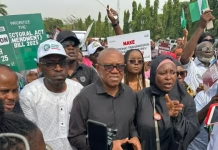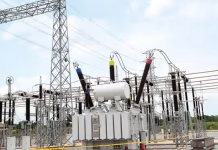President Bola Tinubu has announced that selling Nigeria’s crude oil in naira will help stabilize the economy by reducing foreign exchange risks and transaction costs. This policy aims to enhance the efficiency of local refineries and support the domestic currency.
Speaking at the 8th Nigeria International Energy Summit (NIES 2025) in Abuja, Tinubu—represented by Dr. Doris Uzoka-Anite, Minister of State for Finance—emphasized that this initiative would create a more stable local market and lower fuel prices for Nigerians.
Key Highlights of Tinubu’s Speech:
- Boosting Local Refining Capacity: Selling crude in naira will make refineries more competitive and help lower fuel prices.
- Strengthening the Naira: This move supports the local currency, reducing reliance on foreign exchange for crude transactions.
- Economic Growth and Stability: More affordable petroleum products will improve living standards and stimulate economic growth.
- Mitigating Subsidy Removal Effects: This policy is expected to cushion the impact of fuel subsidy removal.
Tinubu stated that his administration remains committed to energy sector reforms. Over the past two years, major initiatives such as fuel subsidy removal and foreign exchange liberalization have positioned Nigeria as an attractive investment destination.
A major milestone in Nigeria’s energy sector is the country’s selection as the host nation for the African Energy Bank headquarters. This achievement, Tinubu noted, cements Nigeria’s leadership in Africa’s energy landscape and enhances investment opportunities in the oil and gas sector.
The President also highlighted strategic interventions that have led to increased crude oil production, improved security, and investment incentives in the upstream sector. He further noted that his government has streamlined regulatory processes and promoted indigenous participation through the Presidential Executive Order on Oil & Gas Sector Reforms.
Looking ahead, the government is focused on completing major gas infrastructure projects, including the Ajaokuta-Kaduna-Kano Gas Pipeline, which will improve access to clean energy for industries and households. Additionally, the Presidential Compressed Natural Gas Initiative (P-CNGI) is being implemented to diversify Nigeria’s fuel sources and make transportation more affordable.
In the fiscal space, the administration is working on tax reforms to create a business-friendly environment, simplify regulations, and attract more investments. These policies aim to remove barriers to business growth and stimulate economic development.
With the Port Harcourt and Warri refineries coming on stream, Nigeria’s refining capacity will increase, leading to cheaper petroleum products for citizens. Tinubu also disclosed that the government is developing a hydrogen energy policy to attract investors and integrate hydrogen into the country’s energy mix.












